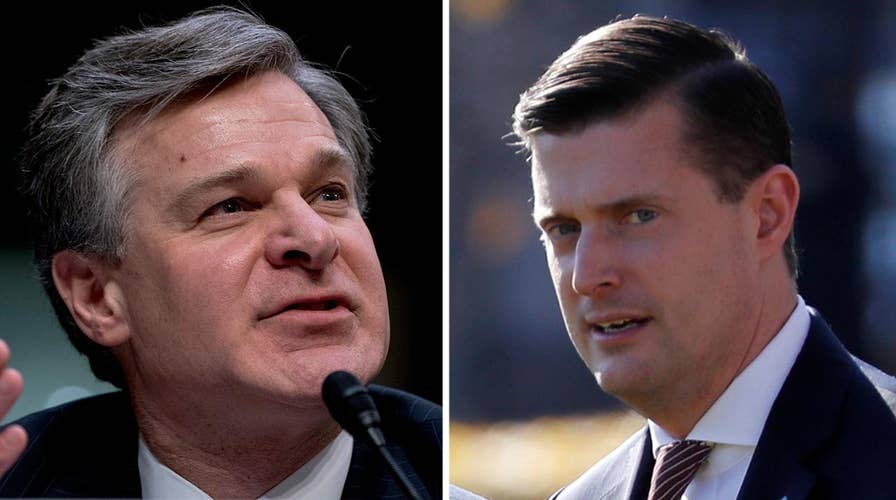FBI director on timeline of Rob Porter's background check
Christopher Wray says he's confident that the FBI followed proper protocol and completed Robert Porter's background investigation in late July, 2017.
FBI Director Christopher Wray testified Tuesday that former White House staff secretary Rob Porter had completed a background check months before he was forced to resign over domestic allegations against him -- conflicting with White House timelines that said the check was ongoing.
Wray told lawmakers at a Senate Intelligence Committee hearing that the FBI followed established protocols and submitted a partial report on Porter in March 2017, followed by a "completed" background investigation in late July.
Wray acknowledged there were follow-ups. "Soon thereafter, we received request for follow-up inquiry and we did the follow-up and provided that information in November and ... we administratively closed the file in January," he said.
Wray added that the FBI obtained “additional information” this month, which they in turn passed to the White House.
It was unclear whether that information pertained to the abuse allegations. The testimony by Wray, though, appears to conflict with the narrative from the White House, which said the background check into Porter was not completed -- and that was why there was no action against Porter despite allegations of abuse by his two ex-wives.
On Monday, White House Press Secretary Sarah Sanders said, "The process for the background was ongoing, and the White House had not received any specific papers regarding the completion of that background check."
The White House initially released a statement last Tuesday pushing back on the allegations and defending Porter. But within 24 hours, as images emerged of one of Porter’s ex-wives with a black eye, Porter resigned. Porter has denied the allegations against him.
White House officials have said they were not aware of the extent of the allegations until last week. The timeline has raised questions about what White House Chief of Staff John Kelly knew, and when.
Sanders, pressed by reporters at Tuesday’s briefing about Wray’s account, explained that the White House personnel security office got information last year for what they considered the final background investigation report. However, she said they hadn’t made a final recommendation because “the process was still ongoing”
“The FBI's July report required significant additional investigatory field work before [the] personnel security office could begin to evaluate the information for adjudication. As Director Wray said, information was still coming to the White House personnel security office in February,” she said. “The FBI portion was closed. The White House personnel security office, who's the one that makes the recommendation for adjudication, had not finished their process and therefore had not made a recommendation to the White House.”
Trump was asked about Porter on Friday and told reporters “it was very sad when we heard about it.” He added that Porter said he was innocent.
"He said very strongly yesterday that he's innocent so you have to talk to him about that, but we absolutely wish him well, he did a very good job when he was at the White House," he said.
The case also has raised questions about security clearances at the White House. Porter was serving on an interim security clearance while the check was pending.
Earlier Tuesday, Director of National Intelligence Dan Coats described the system of security clearance as “broken” and in need of an overhaul.
"We have to basically start with a clean sheet and say, `What can we do better to make sure that we get the correct background info necessary to certify that someone should be working within our community and in the government?"' Coats told the Associated Press.
"But how can we do it in a way that doesn't leave us with hundreds of thousands waiting to be looked at and certified, with key slots open in various agencies?"
The AP reports that it takes approximately four months for clearance to access “secret” information and nine-to-10 months for “top-secret” clearance.
The Associated Press contributed to this report.





















